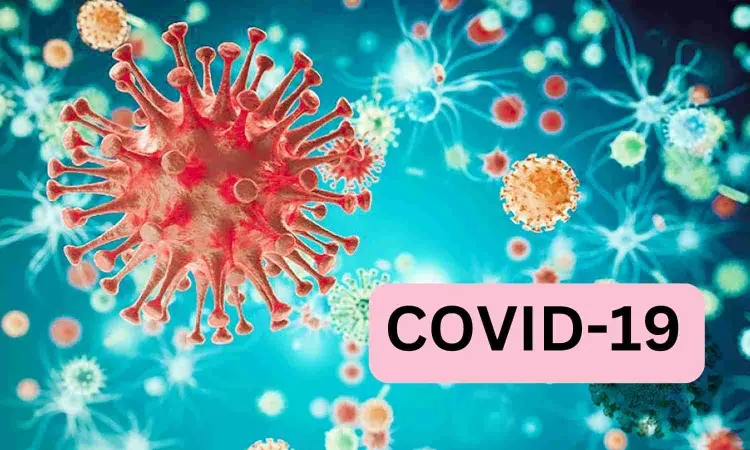- Home
- Medical news & Guidelines
- Anesthesiology
- Cardiology and CTVS
- Critical Care
- Dentistry
- Dermatology
- Diabetes and Endocrinology
- ENT
- Gastroenterology
- Medicine
- Nephrology
- Neurology
- Obstretics-Gynaecology
- Oncology
- Ophthalmology
- Orthopaedics
- Pediatrics-Neonatology
- Psychiatry
- Pulmonology
- Radiology
- Surgery
- Urology
- Laboratory Medicine
- Diet
- Nursing
- Paramedical
- Physiotherapy
- Health news
- Fact Check
- Bone Health Fact Check
- Brain Health Fact Check
- Cancer Related Fact Check
- Child Care Fact Check
- Dental and oral health fact check
- Diabetes and metabolic health fact check
- Diet and Nutrition Fact Check
- Eye and ENT Care Fact Check
- Fitness fact check
- Gut health fact check
- Heart health fact check
- Kidney health fact check
- Medical education fact check
- Men's health fact check
- Respiratory fact check
- Skin and hair care fact check
- Vaccine and Immunization fact check
- Women's health fact check
- AYUSH
- State News
- Andaman and Nicobar Islands
- Andhra Pradesh
- Arunachal Pradesh
- Assam
- Bihar
- Chandigarh
- Chattisgarh
- Dadra and Nagar Haveli
- Daman and Diu
- Delhi
- Goa
- Gujarat
- Haryana
- Himachal Pradesh
- Jammu & Kashmir
- Jharkhand
- Karnataka
- Kerala
- Ladakh
- Lakshadweep
- Madhya Pradesh
- Maharashtra
- Manipur
- Meghalaya
- Mizoram
- Nagaland
- Odisha
- Puducherry
- Punjab
- Rajasthan
- Sikkim
- Tamil Nadu
- Telangana
- Tripura
- Uttar Pradesh
- Uttrakhand
- West Bengal
- Medical Education
- Industry
Higher dosage of anticoagulation linked to lower mortality risk among COVID-19 patients: Study

A prospective metanalysis of clinical trials examined the effects of high and low doses of anticoagulation for hospitalized patients with COVID-19. The study found that administering therapeutic dose anticoagulation with heparins reduced mortality, need for invasive mechanical ventilation (IMV) and thromboembolic events compared with prophylactic dose heparins. The findings are published in Annals of Internal Medicine.
Researchers funded by the World Health Organization studied data from 18 randomized clinical trials which randomly assigned patients hospitalized for COVID-19 to higher versus lower doses of anticoagulants. The intensity of anticoagulant used was classified as prophylactic, intermediate, or therapeutic dosing.
The objective of the study was to estimate intention-to-treat effects of therapeutic vs prophylactic; therapeutic vs intermediate; and intermediate vs prophylactic dose anticoagulation in hospitalized patients with suspected or confirmed COVID-19. The primary outcome was all-cause mortality by 28 days after randomization, and secondary outcomes were progression to IMV or death, thromboembolic events and major bleeding.
The majority of trials studied evaluated heparins, including enoxaparin, tinzaparin or dalteparin, so the researchers focused their findings on anticoagulation using heparins. The researchers found that administering therapeutic vs prophylactic-dose anticoagulation to patients hospitalized for COVID-19 was associated with 23% lower 28-day mortality. Mortality was higher for therapeutic vs intermediate dose anticoagulation; however, the researchers note that this comparison was not estimated precisely. Mortality risk was similar for similar for intermediate vs prophylactic dose anticoagulation. Risk of progression to IMV or death was similar to mortality risk. Across all dosage comparisons, the risk for major bleeding was higher, but the risk for thromboembolic events was lower.
The findings suggest a high certainty that therapeutic dose anticoagulation of heparin reduces 28-day mortality in hospitalized patients with COVID-19.
Reference:
The WHO Rapid Evidence Appraisal for COVID-19 Therapies (REACT) Working Group, The WHO Rapid Evidence Appraisal for COVID-19 Therapies (REACT) Working Group, et al. Anticoagulation Among Patients Hospitalized for COVID-19: A Systematic Review and Prospective Meta-analysis. Ann Intern Med. [Epub 24 December 2024]. doi:10.7326/ANNALS-24-00800
Dr Kamal Kant Kohli-MBBS, DTCD- a chest specialist with more than 30 years of practice and a flair for writing clinical articles, Dr Kamal Kant Kohli joined Medical Dialogues as a Chief Editor of Medical News. Besides writing articles, as an editor, he proofreads and verifies all the medical content published on Medical Dialogues including those coming from journals, studies,medical conferences,guidelines etc. Email: drkohli@medicaldialogues.in. Contact no. 011-43720751


